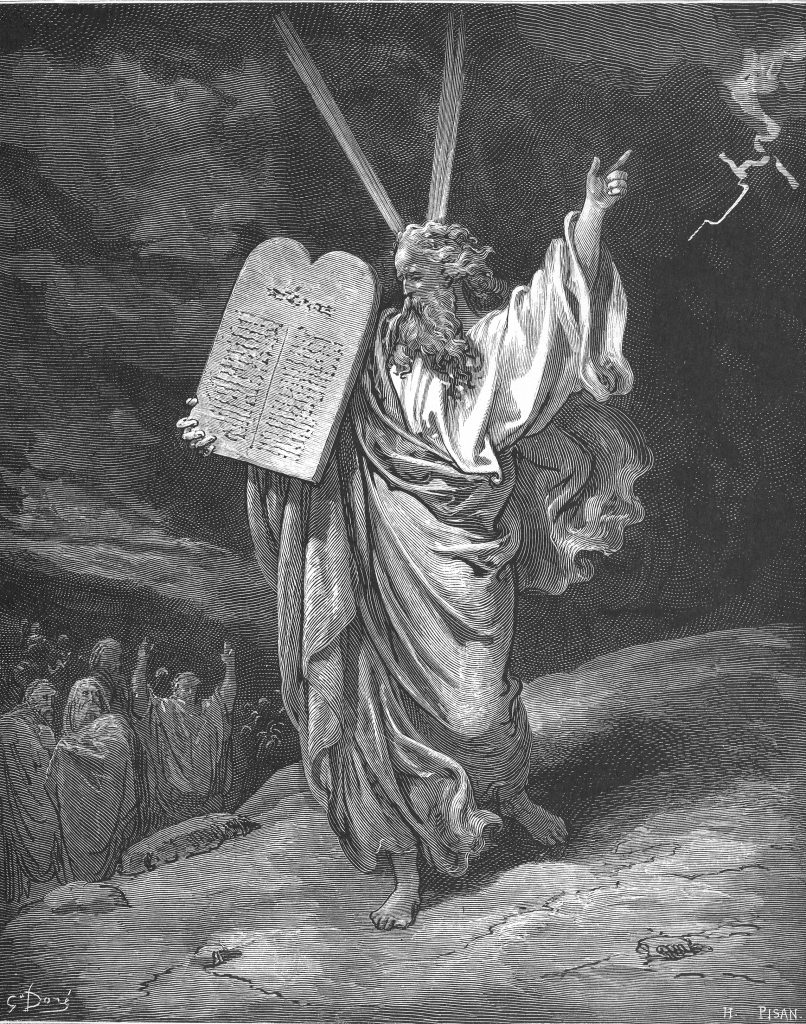Dear Brothers and Sisters,

As Tammy and I waited in an airport lobby near the gate where we would soon board our plane to fly home, I noticed a young man two seats away glancing at me repeatedly. After several minutes he asked, “Are you Joseph Tkach?” He seemed delighted to start a conversation, noting that he had recently been disfellowshipped from one of the Sabbatarian groups. Our conversation soon turned to the law of God—he was quite interested in my comment that Christians understand that though God gave Israel the law, they were incapable of obeying it perfectly. We agreed that Israel truly did have a “colorful” history, often separating itself from God’s law. We also agreed that this was no surprise to God, for he knows the beginning from the end.

(public domain via Wikimedia Commons)
I then mentioned to him that the law given to Israel through Moses had 613 commands. He agreed that there are numerous arguments concerning how many of these laws are binding on Christians. Some argue all are to be kept because all are “from God.” But if that were true, Christians should be sacrificing animals and wearing phylacteries. He agreed there are all sorts of opinions concerning which of these 613 commands have a spiritual application today and which do not. We agreed that the various Sabbatarian groups are divided on this issue—some practicing physical circumcision; some the land Sabbaths and Israel’s festivals; some a first tithe but not a second or third, and some three; some keeping the Sabbath but not the annual festivals; some observing new moons and sacred names—each believing their “package” of doctrines is biblically correct and the others are not. He noted he had been wrestling personally with this issue for some time and had discontinued the way he had been observing the Sabbath, though he still worried that he might not be keeping it correctly.
Surprisingly, he agreed that many Sabbatarians err in not recognizing that the coming of God in the flesh (in the person of Jesus) established what Scripture refers to as the “new covenant” (Hebrews 8:6), making the law as it was given to Israel obsolete (Hebrews 8:13). Those who do not acknowledge this basic truth, and so seek to live by the terms of the law of Moses (added 430 after God established the covenant with Abraham, see Gal. 3:17) are not practicing the historic Christian faith. I think a breakthrough in our discussion came for him when he understood to be false the idea (held by many Sabbatarians) that we are now “between the old and new covenants” (with the new covenant not coming until Jesus returns). He also agreed with me that Jesus was the real sacrifice for sin (Hebrews 10:1-3) and though peace offerings and fellowship sacrifices are not specifically said to be done away in the New Testament, we know Jesus fulfilled them as well. As Jesus declared, the Scriptures do testify of him, and he fulfills the law.

The young man told me he still has questions about keeping the Sabbath. I told him the Sabbatarian perspective fails to understand that the application of the law has been transformed by Jesus’ first coming. Though still valid, the law of God now applies in a spiritual way—one that takes full account of Christ’s fulfillment of the law as it was given to Israel; one that relies on our deepened relationship with God through Christ and by the Spirit, which reaches down into our very nature—into our hearts and minds. By the Spirit, we now live out our obedience to God as members of the Body of Christ. For example, if our hearts are circumcised by the Spirit of Christ, it does not matter whether or not we have been circumcised in the flesh.
Christ’s fulfillment of the law means our obedience to God flows out from that deeper and more intensive work of God accomplished by Christ and the coming of his Spirit. As Christians, our obedience flows from what always was behind the law, namely the heart, mind and ultimate purposes of God. We see this in Jesus’ new command: “Love one another. As I have loved you, so you must love one another” (John 13:34). Jesus both spoke and lived this command, knowing that, in and through his earthly ministry, God would, by the power of the Spirit, write the law upon our hearts, thus fulfilling the prophecies of Joel, Jeremiah and Ezekiel.
By bringing a new covenant that fulfills and completes the task of the old, Christ transformed our relationship to the law and renewed the form that our obedience takes as his people. The same underlying law of love exists, but Jesus personified that law and fulfilled it. The old covenant with Israel and the law enclosed within it (including sacrifices, tassels and Jubilee years) had, for the nation of Israel, specific, particular applications of the underlying law of love. But those specifics are, in many cases, now obsolete. The spirit of the law remains, but the letter of the written law specifying the particular form of obedience does not necessarily hold.
The law could not fulfill itself; it could not change hearts; it could not prevent its own misuse; it could not guard against temptation; it could not specify the particular forms of obedience for each and every family on earth. Since the completion of Jesus’ earthy ministry and his sending of the Holy Spirit, there are now other ways by which we express our devotion to God and our love for our neighbors. Those who have received the Spirit can now better hear the Word of God and understand God’s purposes for their obedience because that obedience was embodied and revealed in Christ, passed on to us by his apostles, and preserved for us in the books we call the New Testament. Jesus, our great High Priest, shows us the heart of the Father and sends us the Spirit. By the Holy Spirit, we can now respond to the Word of God out of the depths of our heart, bearing witness in word and deed to God’s purposes to extend his blessing to all families of the earth. This far exceeds what the law could do, for it is far beyond what God intended the law to accomplish.
The young man agreed with these points, then asked how this understanding applies to the Sabbath. I noted that the Sabbath had several purposes for the people of Israel: it reminded them of creation; it reminded them of their exodus from Egypt; it reminded them of their special relationship with God; and it provided physical rest for animals, servants and families. Morally, the Sabbath reminded Israel of their duty to cease from evil works. Christologically, it pointed them to the need for spiritual rest and completion in the coming Messiah—trusting in him rather than in their own works for salvation. The Sabbath also symbolized the completion of creation at the end of the age.
I shared that most Sabbatarians seem unable to see that the regulations of the law, given to Israel through Moses, were temporary—restricted to a particular time and place in the history of the nation of Israel. I noted that it is not hard to see that “not cutting the corner of your beard” or “make tassels on the four corners of the cloak you wear” are not relevant for all times and places. When God’s purposes for Israel as a nation were fulfilled in Jesus, God, through his Word and Spirit reached out to all people. As a result, the form of obedience to God changed to fit the new situation.
When it comes to the seventh-day Sabbath, authentic Christianity does not turn the seventh day of the week into a form of astrology as if God had made one day of the week superior to the others. Instead of setting a single day aside to acknowledge God’s holiness, God now resides in us by his Spirit, thereby making all our time holy. Though we could meet together on any day of the week to celebrate God’s presence with us, most Christian churches meet for worship on Sunday, the day most widely-regarded as the day on which Jesus rose from the dead, thus fulfilling the old covenant promises. Jesus magnified the Sabbath law (and all aspects of the Torah) far beyond the temporal limits of what the written letter of the law could do. He even elevated the law of “love your neighbor as you love yourself” to “love one another as I have loved you.” This is a staggering quality of love that cannot be captured in 613 commands (or even in 6,000 commands!). God’s faithful fulfillment of the law makes Jesus, not a written code, our center point. We don’t focus on a day of the week, we focus on him. We live each day in him, because he is our rest.
Before we boarded our respective flights, we agreed that the spiritual application of the Sabbath law is about living a life of faith in Christ—a life that, by the grace of God, through the new and deeper work of the Holy Spirit within us, changes us from the inside-out.
Forever grateful for God’s grace that heals us from head to toe,
Joseph Tkach
PS: I asked Gary Deddo to write an essay that elaborates on what I’ve shared here and also in my letter on the covenants in the March 22 issue of Weekly Update. You’ll find his essay in this issue (click here)—it’s long, I know, but the topic deserves a comprehensive review. I encourage you to read his essay carefully.



Thanks, Joe. Great intro to Gary’s article!
Every blessing,
Santiago
Thank you for setting up an example,to most Christians, in using the time, waiting to board a plane, to discuss Godly principles. Jesus did that, also, as at one stage He used that time to minister to a Samaritan woman (John 4).